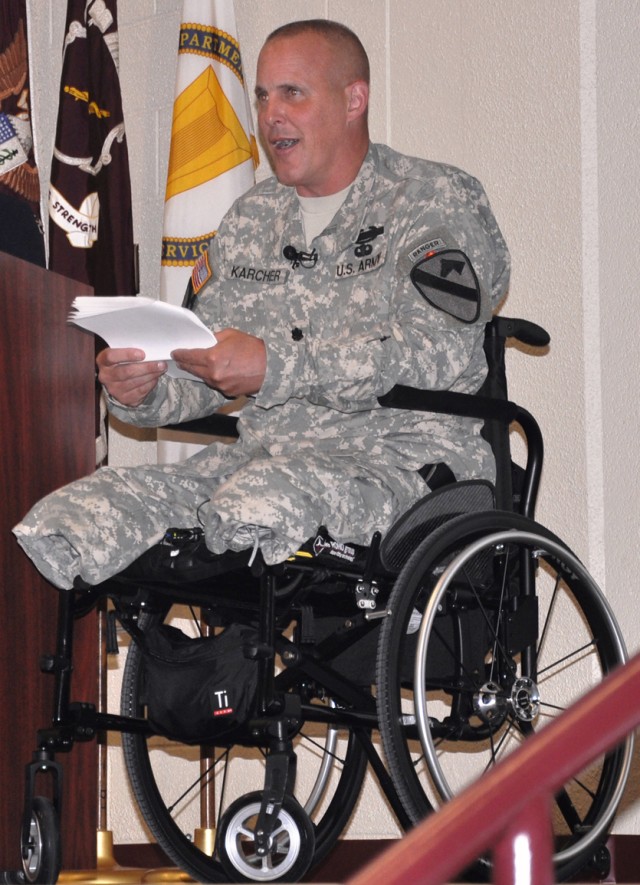FORT SAM HOUSTON, Texas -- "A good medic is worth his weight in gold and a good physician assistant is a miracle worker," Lt. Col. Tim Karcher told the crowd at the Blesse Auditorium June 17.
The colonel came to the leadership call to give the audience a frank and honest look into a line commander's perspective on military health care.
A former battalion commander for the 2/5th Cavalry, 1st Cavalry Division, Karcher had three tours in Iraq and commanded more than 900 Soldiers in Sadr City, in northeastern Baghdad.
He was injured during his second tour, taking a gunshot wound to his left shoulder and became a double amputee during his third tour. Karcher lost both legs above the knees as a result of an explosively formed penetrator punching a hole through the passenger door of his vehicle.
He didn't know how severe his injuries were at the time. "I first thought I had two broken legs. Oops!" he said.
"Then I looked down and realized my M4 carbine was broken in half and then I saw my boot was away from me and saw spurts of blood and I thought, 'Wow, this is a bad day!'"
After his introduction, he thanked the audience and said, "I hope not to bore you, but I do hope to amuse you a bit. I'd stand up, but that would really amuse everyone - except me!"
It was that kind of self-deprecating humor that kept the mood light and the audience attentive.
Serving with line medics throughout his career, the colonel said his perspective has changed dramatically since he joined the Army.
"I used to think that if you didn't roll around in the mud and try and kill people, then you weren't a real Soldier. But, medics in our units are some of the greatest Soldiers we've got," Karcher said.
"They are some of the most selfless and bravest Soldiers I have ever met. My medic didn't freak out; he took care of me. He slapped the tourniquets on me, he talked to me; he kept me alive."
Karcher said he still gets annoyed when he hears the media put down the Army health care system.
"You never hear how it has saved our lives," he said. "We have the best of everything in the military health care system, but we only hear about the bad things. If you've never experienced it yourself, you start to believe those stereotypes."
The colonel also related how important it was to have the support of his Family and of his fellow Soldiers.
"Never forget that our Soldiers and Families are inextricably linked. The one place where a lot of our Families are injected into our military is in the health care system," he said. "We've got to take care of Soldiers and their Families the best we can.
The father of three girls, Karcher said kids can live with anything as long as you're straight with them.
"I was concerned that they were going to be a little vain about having a father without legs. Now they laugh at my sick jokes about being a no-legged cripple. They let me swim in the pool with them and their friends. I float really well, by the way."
Karcher's story was featured on ABC News by Chief Foreign Affairs Correspondent Martha Raddatz, who had interviewed the colonel in Iraq before his injury. She also followed his progress afterwards on the ABC World News daily blog.
The colonel and his wife, Alesia, also shared their experiences in their blog, "Tim's Incredible Journey" (http://www.caringbridge.org/visit/timkarcher). It's had more than 117,000 visitors, and counts Gen. David Petraeus, commander of U.S. Central Command, as one of its regular readers.
While not very fond of the blog, he says it gives him a chance to brag about the Army and what it does for the nation and Soldiers.
"My wife started it to keep friends and Family updated while I was recovering so she wouldn't have to e-mail and call everyone every night after spending the whole day with me. We thought it would just be friends and Family, so no big deal," Karcher said. "Then we had Gen. Petraeus come in to visit and he told my wife that he read my blog every day! She just said, 'Holy crap!' She decided not to put any bad stuff on there after that!"
The colonel said he plans on staying in the Army, as he hadn't planned on retirement before his injury happened. "I'd be a great paperweight if anybody needs one," Karcher said.
His sense of humor has helped Karcher to get through his rehabilitation process, along with the support of his Family.
The colonel, married for 19 years, said Alesia cut him no slack while he was home for rehabilitation.
"My wife is a physical therapist. You can't imagine what joy that's like," Karcher said with a chuckle.
"When I came home from the gunshot wound with my arm in a sling, there was blue tape around all the baseboards and ceilings and my wife told me I was going to paint the house. I told her there was no therapeutic value in that, but the bottom line was she wanted the flipping house painted."


Social Sharing